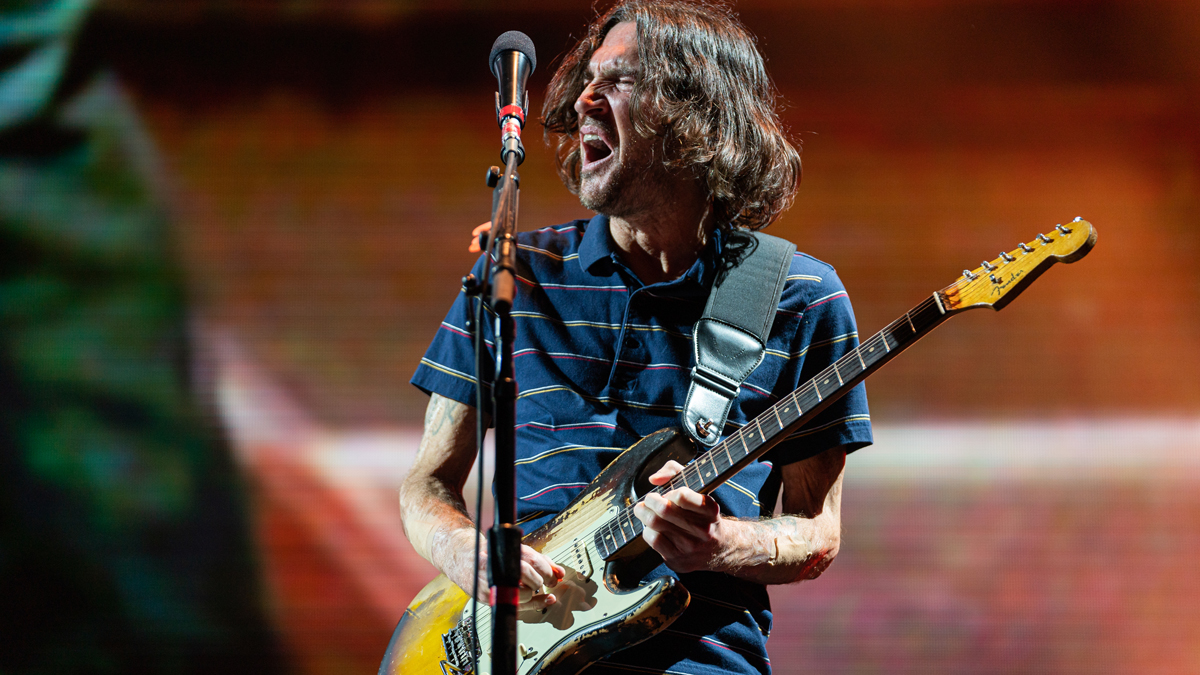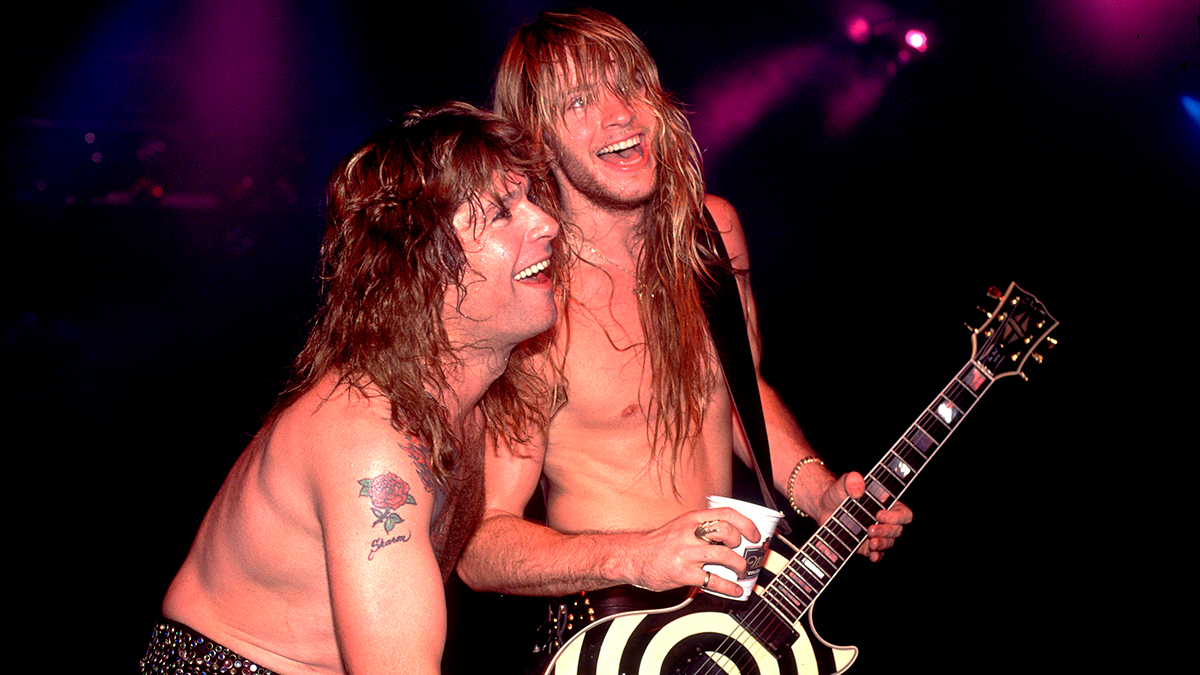Blues? Prog? Floydian grunge? 5 guitar highlights from Return of the Dream Canteen, Red Hot Chili Peppers’ most eclectic album yet
John Frusciante lets loose on a record that takes considerably more risks than Unlimited Love

Red Hot Chili Peppers recorded 48 songs during their 2021 studio sessions – their first with John Frusciante since 2005 – and the initial fruits of their labor emerged in April, on the 17-track Unlimited Love. During an in-depth interview about that album, Frusciante told this writer, “I definitely feel like we saved some of the best stuff for the potential next album” – and he wasn’t kidding.
Return of the Dream Canteen paints a much more varied picture of the Chili Peppers’ reunion than its comparatively safe predecessor. It sees the band color outside the lines they drew during their 2000s renaissance, while occasionally harking back to their ’80s funk pomp.
It also more explicitly delivers on Frusciante’s guitar approach for the sessions, which aimed to team the rootsy blues of Albert and Freddie King with the solo heroics of Eddie Van Halen and acerbic attack of Kurt Cobain.
In short, it’s a surprising listen for anyone who thought they knew what to expect from Frusciante and a RHCP record in 2022. It also provides additional context to Frusciante’s comments in that marathon interview earlier this year.
Here, we pull out a few of Dream Canteen’s guitar highlights, with additional insight from John himself, including several previously unpublished interview excerpts.
1. Eddie
We’ve all heard RHCP’s tribute to Eddie Van Halen, but in the context of the album, it really pops. You’d be forgiven for thinking the band had rehashed By the Way from those opening notes – and the timbre and melodies certainly channel that album – but Eddie is one of the most successful melancholy ballads their latter-day era has produced.
Yet it’s juxtaposed with an absolutely blazing solo that ranks among Frusciante’s most virtuosic: two-hand tapping, whammy warbles and quicksilver pentatonic runs are all present and correct, each laced with love for the fallen guitar hero – and live versions are even more fiery.
All the latest guitar news, interviews, lessons, reviews, deals and more, direct to your inbox!
“I really love guitar players like Randy Rhoads and Eddie Van Halen for the way that they could make the instrument explode through hand and whammy bar techniques,” Frusciante told us of his influences for the sessions. “But I also really like the way people like Greg Ginn or Kurt Cobain play without it being so much about technique – although there are all kinds of unconventional techniques in there – but the focus is definitely a more visceral thing.
“Eventually, by the time we were recording, my concept was to find a bridge between those two conceptions of the instrument: that idea of making it explode with the electricity of the human energy that comes through the strings.”
2. Fake As Fu@k
Frusciante said his initial rehearsals back with the Chili Peppers consisted primarily of material from the LA funk institution’s first three albums, and that’s certainly in evidence on Fake as Fu@k. That sweet voice-leading intro is something of a Trojan Horse, giving way to a furious syncopated vamp that nods to the band’s Freaky Styley era – something reinforced by Flea’s trumpet fills in later verses.
“We were just playing songs by other people and really early Chili Peppers stuff for a month or two,” Frusciante recalls of the band’s early jams. “And we just had a lot of fun. And luckily that spirit of fun that we had when we were doing that ended up staying with us throughout the whole writing process.”
That exuberance is present in Fake As Fu@k’s tempo shifts, which provide a playful twist on the band’s funk formula, and make for an even more dramatic contrast when Frusciante kicks on the Boss DS-2 for the grungy outro, complete with the odd scorching pentatonic fill. There’s no big solo, but as a distillation of all the guitar hero’s influences, this is pretty comprehensive.
3. Handful
Handful plays host to some of the tastiest voicings Frusciante has yet splashed on RHCP’s canvas, and the waves of rich CE-1 chorus are the cherry on top.
But halfway through, the track morphs into a ’70s prog epic, positioned somewhere between the Mars Volta and Genesis, with a rollicking drum pattern, wandering organ and guitar counterpoints. And when the distorted riff variation kicks in? Chef’s kiss.
The Genesis comparisons also crop up in the track that follows, The Drummer, which is similarly driving and organ-led – and there’s good reason for that.
“I really love the band Genesis, their prog stuff, as well as their pop stuff,” Frusciante says. “And their keyboardist Tony Banks, I put him up there with the Beatles as far as really coming up with imaginative chord progressions all over the place. He's really one of the most masterful chordsmiths that I think we've ever had.
“He makes these chord progressions that are so fluid, they're more like a melody than they are a chord progression. I definitely became really fluent in that style of progression during the time that I wasn't in the band.”
4. Bag of Grins
One of the more sinister compositions to emerge from Frusciante’s return, Bag of Grins foregrounds an unsettling chord progression that steers well clear of conventional songwriting wisdom, and builds to a distorted, Nirvana-meets-Interstellar Overdrive chorus.
Indeed, the track takes many of its songwriting cues from early Pink Floyd recordings with Syd Barrett, who Frusciante heralds as a key influence on the Unlimited Love and Dream Canteen sessions for his “non-modal way” of positioning unlikely major chords next to each other – something that’s most apparent in Bag of Grins’ fierce middle section, which recalls Floyd epic Set the Controls For the Heart of the Sun.
“Syd Barrett began this sort of approach to being able to use regular major chords in a completely different way,” Frusciante relayed.
“Sometimes, when you learn the songs like that, you think, ‘That just seems arbitrary to put that chord next to that chord,’ but it really works in the song and the melody comes out great. I definitely wrote a lot of stuff inspired by that style of chord changes.”
5. Carry Me Home
Red Hot Chili Peppers play the blues! Dream Canteen isn’t an album awash with solos, but along with Eddie, Carry Me Home is the album’s guitar showcase.
Frusciante summons the spirit of Hendrix throughout the ’60s-inspired track: earthy leads open the song, leading into some nimbly embellished chords and a huge pentatonic riff in the vein of Manic Depression or Hey Joe – and there are plenty of wailing fuzz licks in between.
Earlier this year, Frusciante told us: “I wanted to imagine that I was a guy coming up at the same time as The Beatles or Cream or Jimi Hendrix, to see: ‘What would I have done to embellish upon that foundation?’ I felt like as long as I’m getting back into making rock music, let’s go to the roots of it.”
Carry Me Home more than delivers on that premise.
- Return of the Dream Canteen is available to preorder now ahead of its release on October 14 via Warner Record.

Mike has been Editor-in-Chief of GuitarWorld.com since 2019, and an offset fiend and recovering pedal addict for far longer. He has a master's degree in journalism from Cardiff University, and 15 years' experience writing and editing for guitar publications including MusicRadar, Total Guitar and Guitarist, as well as 20 years of recording and live experience in original and function bands. During his career, he has interviewed the likes of John Frusciante, Chris Cornell, Tom Morello, Matt Bellamy, Kirk Hammett, Jerry Cantrell, Joe Satriani, Tom DeLonge, Radiohead's Ed O'Brien, Polyphia, Tosin Abasi, Yvette Young and many more. His writing also appears in the The Cambridge Companion to the Electric Guitar. In his free time, you'll find him making progressive instrumental rock as Maebe.





